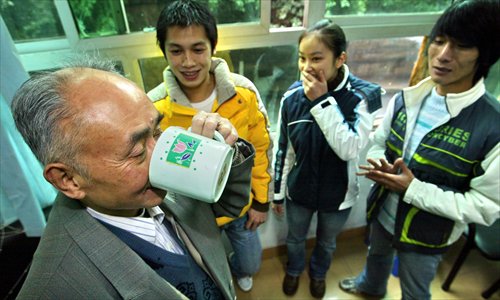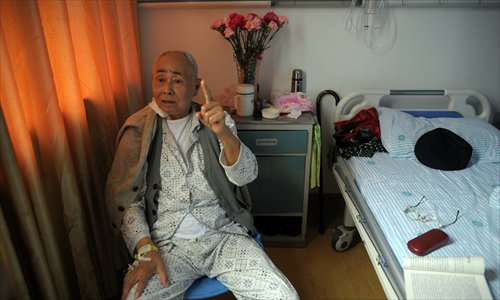100,000 practice urine therapy, triggering public debate

Zhou Linhui (left), a retired professor in Chongqing, drinks his urine before three other surprised young people on December 12, 2006. Photo: IC

Zhou, who has insisted on urine therapy for 24 years, was hospitalized to receive dialytic treatment for renal failure on June 24. Photo: CFP
Like most seniors, 79-year-old Bao Yafu likes to keep healthy, and maintain a regular routine - so he starts every morning with a fresh cup of urine.
Bao, a retired engineer from Wuhan, Hubei Province, claims that 22 years of swilling urine - he also uses to it to wash his face and dab his eyes - has cured his constipation and mouth ulcers, improved his eyesight and given him the bone density of a 30-year-old man.
"I've tried many other ways to cure myself," Bao told the Global Times, "only this elixir worked."
Users, believed to number tens of thousands, claim that so-called "urine therapy" can cure everything from a cold to cancer. However, urine therapy has not been scientifically proven to be the cure of anything.
Even though the tradition of imbibing urine has its roots back in ancient China, it is still proving a tough sell to convince the Chinese public that drinking one's own urine is really good for their health.
Three cups of pee
Bao's life first took a turn toward precious bodily fluids in 1972, after he met an old Hongkonger on a train who claimed to be very sick and wanting to find his son he could take him back home to take over family business. Bao helped him. Two decades later, Bao learned from the son that the "sick" old man was still very much alive and kicking, thanks to the miracle of drinking urine; he was intrigued.
Bao began to write letters to international experts and doctors seeking more information, but received little help. So he decided to give urine therapy a try in 1992.
Bao says he noticed immediate changes: Within a day, his constipation was gone. Two weeks later, banished too were his mouth ulcers. Within six months, his eyesight was keener.
After two years of practicing urine therapy, Bao wanted to set up the China Urine Therapy Association (CUTA) to promote the cure. Yet his local Ministry of Health rejected the application as having no scientific credibility.
This did not deter the enthusiast of urine therapy. In 2008, the association was registered in Hong Kong. Since then, CUTA has attracted over 1,000 members, mainly among the middle-aged and elderly. Meanwhile, it is estimated that there are up to 100,000 people practicing urine therapy all over the country (Bao thinks the number is even higher, as many keep the habit on the sly).
To become a member of CUTA, one has to practice the therapy, agree to promote it, and pay a yearly membership fee of 20 yuan ($3). Each year, users gather together to share their experiences. One user advised practitioners to keep a juice box handy to collect urine when using public toilets, Zhou Zhaoyan recalls.
Zhou, 70, from Guangdong Province has been drinking his own water for 10 years and said it is not that difficult."It tastes a little salty," Zhou admitted. "At first I wanted to puke, and had diarrhea, then after a few days I felt fine."
As opposed to more active promoters, Zhou is extremely low key about his habit, and barely discusses it with others. "I am not ashamed of it," Zhou argued. "I just don't feel it necessary to argue about it with someone who has never tried it."
Doctors warn that drinking one's own urine can cause uremic poisoning, but Zhou claims that there are no side effects and he is now in a much healthier condition. Still, it is difficult for users to convince even those close to them to try it. "My wife finds it disgusting and dirty," Zhou admitted.
Bao is the sole member of his family who practices it, at least so far as they are aware - one time when his grandson was sick, Zhou says he secretly used urine therapy on him, adding that "it worked."
'Not recommended'
Doctors are skeptical. Guo Xuexi, deputy director of pathology at the No.1 Central Hospital of Tianjin, told the Global Times that drinking urine in the long term might cause harm to the stomach lining, as it is a bodily waste.
"For its supporters, it might be more a psychological medicine," Guo said, referring to the placebo effect. Proponents, however, claim urine is a kind of "magic water" that contains calcium, magnesium and vitamin C. Guo countered that urine is, in fact, composed of 95 percent water and 5 percent nitrogenous waste.
Guo's opinion is supported by many other doctors who practice Western medicine. Wu Wanrui, of the urology department at Hunan Provincial People's Hospital, told the local Sanxiang City News that reabsorbing waste is harmful.
"From a Western medical point of view, there is no use in drinking it directly," Wu said.
Huang Jianye, an active promoter of urine therapy from Hunan, argues that the therapy works because urine can "send messages back to the brain."
"Urine contains the body's messages - it sends them back to tell the brain what went wrong with your body, and your brain reacts accordingly," Huang was quoted as saying.
China is far from alone in having urine enthusiasts; the controversial therapy is also practiced in other countries. In Thailand, one woman claimed she had eliminated her cancer through drinking her own urine after hearing about the cure from a monk. Her doctor has started recommending urine therapy, according to the BBC.
The benefits of drinking one's urine are also extolled by politicians in India. Morarji Desai, a former prime minister, explained publicly how urine therapy was the "perfect" medical solution for the millions of Indians unable to afford medical treatment, the Times of India reported.
In China, urine is a traditional medicine (TCM) and seen as "the fountain of youth." However, even TCM experts are skeptical.
"Drinking urine was recorded in ancient Chinese medicine books," conceded 72-year-old Liu Shaogui, a retired TCM doctor at the First Affiliated Hospital of Hunan University of Traditional Chinese Medicine. "But it was used to decrease internal heat and stop internal bleeding. It was used as a base to make Chinese medicine, not to drink it directly."
Bao argues that disbelievers have to try it to believe it. CUTA has medical professionals among its membership, such as qualified medic Zhong Tianle from Shanghai Medical Workers College is one of them. Though not a licensed doctor, Zhong joined the association in 2009, aiming to know more about the therapy.
"I think at least you should try something yourself before recommending it to anyone," Zhong told the Global Times, adding he has been practicing with pee for two years with no side effect.
Zhong said he cannot medically prove that urine can cure people's medical problems, but he would still recommend it to others if alternative treatments do not work. But Bao added that drinking urine alone is not enough. "It has to be a combination of urine therapy, psychological therapy, food therapy, medicines and exercises," he explained.
Urine denial
The intense media exposure has put practitioners under the spotlight and forced them to face the public's questions. Many users reached by the Global Times do, indeed, claim that it has no negative or harmful effects and has cured their diseases.
Still, the majority of the society still sees urine drinking as taboo.
Zhou Linhui, 88, a retired professor from the Southwest University of Political Science and Law in Chongqing, had been drinking his own urine for 24 years when he suffered kidney failure and was hospitalized in May.
"The therapy is useless if you are very sick," Zhou told the Chongqing Evening News. "Or why didn't it cure my disease?" His doctor has since urged Zhou to put faith in more scientific answers.
"Not every individual enjoys the same results," Bao argues. "People have to drink the right amount at the right time."
Nevertheless, the overwhelmingly negative reports have encouraged users to open up and defend their habit to the public. And thanks to them, CUTA has received hundreds of applications requesting to join, said Lin Suihua, deputy head of the association.
Fifty-one-year-old Lin, from Guangdong Province, has been necking her own nectar since 1995. She said she is now in a much healthier condition as a result, and wants to introduce this therapy to help others like her.
"We are offering an alternative medicine for people to aid themselves and ease the heavy burden of their medical costs," Lin told the Global Times. Lin has managed to talk her husband into using it, as well as her co-worker's mother, who had cancer the same year Lin started her leftfield therapy.
The arguments continue, but Bao says it's a question of free will and choice: "People are free to decide how they want to begin their day."
"It is free and easy to make," Lin pointed out. "I don't understand why some people have to give us such a hard time."
Zhang Qi contributed to this story
Newspaper headline: A taste of your own medicine